- Home
- Alison Booth
The Philosopher's Daughters Page 16
The Philosopher's Daughters Read online
Page 16
After pulling the cover up, leaving a narrow aperture for her nose, she inhaled the scent of eucalyptus leaves and wood smoke drifting across from the fire kept burning all night long. The gentle snoring of some of the sleepers was interspersed by distant clinking of the horses’ hobble chains, and occasionally the light rustling of a small animal wandering about the camp. Earlier she’d thought she could hear a flute playing. But this must have been in a dream, for on the far side of the campsite she could see the veiled mound that was Henry asleep in his swag.
She tried to relax but she couldn’t go back to sleep. Sarah had said that living at Dimbulah Downs was akin to camping. Surely she was exaggerating. After all, there would be beds and showers and a toilet there. Harriet rolled over again and beneath her shoulder felt another twig, which she chose to ignore. She had to get some sleep before first light when she would be roused up again. Each day they were to travel in two stages, early morning until noon, when the sun glared down at you, with a break for a rest and a meal, and then another few hours’ riding before setting up camp an hour before sundown. It seemed never-ending, though they’d been riding for just two days. With another five days to go, Harriet felt her body would never stand it.
Seeing Sarah again had brought their father’s absence home to Harriet anew. When she’d last been with Sarah they were a family. Now they were only two – or three if you counted Henry. Every day since she’d been reunited with Sarah at Port Darwin she found herself thinking: Oh, I must tell Father about this. Oh, Father will find this so interesting. The void left by his death was growing not shrinking. But this was being irrational, she told herself. She missed him because this new land was so strange, the people so different, the creature comforts so few. Once they arrived at Dimbulah Downs, her anxieties would end.
Her thoughts turned to Charles. Like Father, he too had a rational enquiring mind. Maybe her affection for Charles was so tied up with her love for her father that she couldn’t really tell if she missed Charles or her father. Briefly she wondered what she would have been doing right now if she’d accepted Charles’ proposal. But her decision had been made and she had to look forward and not back. She reminded herself of the physical aversion she had felt at the sight of his hairy wrists. That seemed like a long time ago now.
Feeling more awake than ever, she sat up. The logs on the fire were glowing red. Buried under the ashes at the edge of the fireplace was the damper they would eat for breakfast in a few more hours. She remembered how closely Mick had examined her sketch – her caricature – of Port Darwin the day she’d wanted to sketch the mangroves, and felt embarrassed. She’d thought he was struggling to comprehend her representation of reality and now she realised how patronising that assumption had been. He must have seen many pictures at the mission; religious pictures, pictures in books.
A movement caught her eye and she held her breath: a wallaby was standing at the edge of the glade, its eyes shining as they reflected the firelight. Though she’d seen some in the distance at Port Darwin, she had never before been this close. She and the wallaby watched each other. Its large ears rotated to pick up sound from all directions, first one ear forward and the other back, then the reverse, almost like a little dance, the dance of the ears. At last the animal seemed to decide she was harmless and resumed eating grass.
For an instant she wondered why she cared about Mick’s thoughts as he examined her drawing. She shouldn’t care what anyone thought about her work. She drew for herself, she painted for herself, because in so doing she was seeking an interpretation of reality. Her interpretation and no one else’s.
She lay down again and, holding up one hand to block out the firelight, stared up at the vast sky swathed with stars, an infinity of stars. As she was starting to wonder if there could be more than one infinity and, if so, should she try counting them, she fell into a profound sleep.
* * *
Harriet passed through the final day of the journey like an automaton, able to function solely because she was repeating what she’d done before. She still couldn’t bear being too long in the saddle, although the soreness she’d experienced for the first few days of riding had almost gone. By mid-afternoon, when she felt at last as if she was starting to wake up, she and Sarah dismounted and walked for an hour or so, leading their horses, as they’d done every afternoon of this expedition. The glare was no longer intolerable; earlier she had felt that the harsh white light was so sharp it was piercing her eyes. The dust raised by some of the others, who were riding ahead, stuck to her damp skin. She looked covertly at Sarah, who somehow managed to look cool and beautiful even in this heat, even with a streak of red dust along one cheek where she had wiped a hand over her damp face.
Harriet’s scalp felt itchy, her hair needed washing, and the mosquito bites on her ankles were being chafed by her boots. She would give anything for a bath, a deep cool bath with lavender soap, and fluffy white towels with which to dry herself afterwards. Yet she knew the reality would be a bush shower and perhaps later a swim in the rock pools that Sarah had told her about. She must forget about baths and clean towels.
She watched a couple of lonely looking white clouds that appeared to be following the sinking sun, until suddenly they glowed as if on fire. She looked away quickly and shut her eyes, while her feet kept mechanically marching forward. She saw a multiplicity of orange suns fading to blue and then to what she thought at first was no colour. But she was wrong; this deep red was the colour of the thin layer of flesh that could screen out all this light, all this space, and that could make her forget for a moment that here she was, an insignificant English woman, in the remoteness of northern Australia.
‘How is Miss Harriet?’ Opening her eyes, she saw that Mick had ridden up beside her. His white shirt was covered with a fine powdering of red dust.
She smiled. They hadn’t talked much since she’d learned his pidgin was an affectation. Yet she had subsequently felt that this misunderstanding was a bond rather than a barrier. ‘Apart from being hot and sweaty and in need of a shower, I’m fine.’
‘It’s a long ride when you’re not used to it,’ he said. ‘But we’re almost there. Look!’
Ahead lay the homestead, a glittering of white light off corrugated-iron roofs and walls. The building she guessed was the manager’s residence was positioned on a slight rise. Harriet felt excitement mingled with apprehension. It would be hot but it was a shelter nonetheless, and a guarantor of privacy too. She longed to shut herself away and sleep for hours, for days. The residence was surrounded by some rangy-looking trees and an extensive collection of sheds and yards. Adjacent to the billabong to the north, perhaps a quarter of a mile from the homestead, was the Aboriginal encampment, and beyond that, dense bush. Plumes of smoke from campfires drifted lazily into the sky.
Harriet and Sarah mounted their horses again and broke into a canter. And so it was that Harriet entered the station, where awaiting them was a party comprising a crowd of Aborigines, a few white stockmen, and numerous small children and dogs weaving their way through adult legs.
At this moment a flock of sulphur-crested white cockatoos flew in from beyond the settlement and descended upon the bleached skeleton of a dead eucalyptus tree by the billabong. Their plump white bodies jostled for space on the branches, as if they too were spectators watching the arrival.
‘Almost like coming home,’ said Sarah. ‘Welcome to Dimbulah Downs.’
PART V
Dimbulah Downs, July to October 1894
Chapter 25
A River of Shining Stars
Living in the outback there were never problems waking up in the morning. Ever since their arrival at Dimbulah Downs, Harriet had heard at first light a distant squabbling of cockatoos from the billabong. As the birds massed for their daily exodus it grew into a squawking so loud it almost drowned out Ah Soy’s ringing of the bell for the stockmen’s breakfast. Afterwards,
when the men had gone, she heard children’s voices from the camp by the billabong and the clattering of dishes from the kitchen as Ah Soy cleared up. Soon after came the creaking of the windmill pumping water, and then Sarah’s laughter as she bathed with Bella and Daisy in the primitive shower room that was just a hessian screen around a shower head near the water tank.
Harriet had been so busy working with her sister that she hadn’t the leisure to think in that first week. After the washing had been done, and then the cleaning that Sarah decided had been neglected during her absence, it had been a welcome relief to be on horseback again and spend some time riding to the nearer stock and muster camps.
One of the pleasures of mustering was discovery, Harriet had thought at first. Yet after the second of these trips she’d realised that her feelings about living at Dimbulah Downs were confused, if not contradictory. The immense emptiness here seemed sometimes like a tangible presence hemming her in. The blue dome of the sky looked so hard it felt confining. The relentless sun pressed down upon her so that all she could do was to squint her eyes against the sharp white light and search for shade. It was almost as if she were being corralled, in ever-decreasing circles, like a rogue steer being fenced in by the ringers until the confined space induced it to accept its place in the muster.
She didn’t belong here, even as a visitor. She no longer had any reference point against which to measure her own sense of worth. In London, her father’s love had protected her. In London, and even in Sydney, she’d possessed an identity, as the daughter of the philosopher James Cameron, as well as a suffragist. But here she was nothing. Worse, she felt as if she were losing her old certainties. She didn’t fit into this culture of hard riding and hard physical work. What she thought she was good at had no value out here.
Perhaps she should start painting once more. She’d given up after arriving. Yet it would be hard if not impossible to interpret the brilliant colours of the landscape sluiced by that unrelenting sunlight. Better not to try. It was all too harsh and confronting.
This morning she noticed as if for the first time the pile of books stacked on the chest of drawers and decided to read to the Aboriginal children. Reading to them in English would be an extension to the pidgin that was widely used and taught. In the afternoon, when it was too hot to do anything other than slump down in the shadiest spot, she asked Bella and Daisy to gather a small group of children. Initially she read to them the first few chapters of the battered copy of Pickwick Papers that Henry had brought with him but she quickly discovered this was inappropriate. Her audience had no conception of any of the references that made the book so entertaining. Although they laughed uproariously, she knew it was at her rather than at the story, so she might as well have been reading in Swahili.
Eventually she hit upon the notion of reading poetry to them. They listened, apparently captivated, and quickly learned whole stanzas off by heart. One girl, no more than eight or nine, was a particularly good mimic. She sat cross-legged opposite Harriet, and repeated with her accent, her gestures, her intonation, her rhythm, several stanzas of ‘The Man from Snowy River’ (it was first published in The Bulletin, an Australian news magazine, on 26th April 1890, and was published by Angus & Robertson in October 1895, with other poems by Paterson, in The Man from Snowy River and Other Verses), to the amusement of everyone, including Ah Soy. Sitting a short distance away, he chortled quietly to himself around the stem of his pipe.
* * *
‘Are you reading again today, Hattie?’ Sarah asked.
‘Yes,’ Harriet said, looking up from the clothes she was folding. ‘Banjo Paterson was such a hit yesterday that I’m going to continue with him.’
‘Don’t you want to come out riding with me?’
‘Where are you going?’
‘To one the stock camps. Henry’s offered to take us both.’
‘No, I’d rather stay here. Bella’s going to tell me some of her stories too.’
‘Do you mind if I go?’
‘No, of course not.’
Later, sitting in the shade, Harriet listened, transfixed, while Bella told the tale of how the stars had formed, her elegant hands with their long, slender fingers gesturing as she spoke. Once the sky had been dark, darker than anything they could imagine, dark until two ancestors had sailed up the river into the sky, and there they’d transformed themselves into a star to shine down on their people. And thereafter the spirit of the earth mob after death went up into the sky and made a river of shining stars, big mob star.
So began a new phase in Harriet’s days at Dimbulah Downs. Bella and Daisy would take it in turns to tell stories, and asked Harriet to help them with their English. There were some words that she couldn’t bear to change, for they were like poetry themselves. English was a hybrid language, she told herself, a developing language, and now she would always think of the Milky Way as a shining river, a big mob star.
Soon she realised that the emptiness surrounding her was not emptiness at all but was peopled with a rich and beautiful mythology and history. It seemed that every aspect of the physical world had a spiritual meaning; every place had some relation to the Aborigines’ ancestors. Although the relationship was with their ancestors and not hers, she began to feel as if the landscape were no longer alien, and thus she began to lose her fear of it.
Chapter 26
‘Cleaning Country’
A moth battering itself against the glass shade of the kerosene lamp distracted Harriet from her mail that had arrived with Frank O’Connor that afternoon, some weeks after her arrival at Dimbulah Downs. After crawling out from the mosquito net, she guided the insect out of the window with Aunt Charlotte’s letter, and fastened the shutter. On the counterpane lay a pile of unopened correspondence.
In elegant prose, Aunt Charlotte’s letter expressed the fervent hope that female enfranchisement would soon be enacted in England, although she wasn’t optimistic about the likelihood of this occurring. ‘And Harriet, dear, do please send me more information about the activities of the South Australian Women’s Suffrage League,’ she wrote. ‘How blessed is the colony of South Australia in being founded by social idealists.’ But ruled by pragmatists, Harriet thought, who needed to be re-elected. Strategy might yet win the day: there were more urban voters for Labor than rural, and enfranchisement would work in that party’s favour.
Next Harriet opened an envelope from the Morgans. Mrs Morgan had enclosed newspaper clippings of Harriet’s two letters about the Territory that had been published by Sydney newspapers. She saw that Professor Morgan had scribbled on the top of one clipping: ‘You are your father’s daughter!’
Although part of her was pleased by this, she also felt a twinge of irritation. Professor Morgan meant well but Father had never visited Australia and her opinions were her own. And she was her mother’s daughter too. She thought of those yellow silk slippers left in storage in London. Her last memory of Mother was of laughter. Laughter, and her slippers lying under the bed, in a room rinsed with sunlight. Pale yellow sunlight that was nothing like the merciless glare experienced here.
Now she slit open Charles’ letter. It was better than a newspaper, full of politics and news from both London and Australia. How generous of Charles to devote such care to selecting material that would interest her. When she reached the last page, she read:
I understand that you are still grieving for the loss of your beloved father. He was an exceptional man: a loving father, a loyal friend, and a fine scholar whose works will live on for many years to come.
I trust that your time with Sarah and Henry is bringing you comfort, and that the experience of ‘living at the frontier’ is in every way meeting your expectations. I hope that there you will find the space and the peace to work out what you want from the next phase of your life.
My offer of marriage is still open, my dear. Do not feel you need to reply to
this, as I know it is far too soon for you to reconsider your earlier decision. However, if you ever change your mind, do let me know. I wish that one day you might agree to share your life with me, whether in Australia – there are always jobs for men of my experience in the colonies – or at Home.
She felt deeply moved by his concern, touched by his willingness to consider changing country for her. He was a fine man: clever, loyal, rational, supportive, kind. Everything one could wish for in a lifelong partnership. Marriage to Charles would in a sense emancipate her. She could gain influence as well as companionship in her role as his wife.
She wondered what he would gain from such an alliance. It would be impossible for her to give him what he deserved. Marriage to him was a compromise that she was not ready for. Maybe later she would change her mind – but not yet. Her dreams were still evolving, her ambitions still not clear.
Of course, Charles’ offer wouldn’t stay open for ever. If she didn’t want him, she should give him the chance to find someone else. He would easily find another woman to marry, one who could provide him with companionship and love. But the thought of losing the option of marriage to Charles filled her with unease. Apart from her father, she had never come across a man with qualities as fine as his. Nor had she met a man who would be as willing to give his wife independence. Yet it was Father she was missing rather than Charles. After folding up his letter, she put it away in the envelope, retrieved her travelling desk and set it up on her lap. Writing to Violet would clarify her views and she would welcome Violet’s advice. As usual Violet would be forthright and decisive; she would provide a sounding board, although it would be months before the reply echoed back.

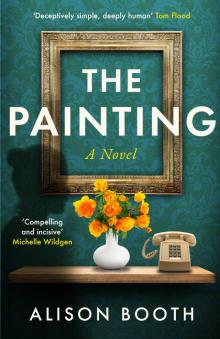 The Painting
The Painting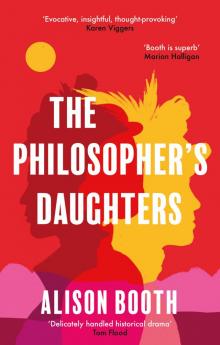 The Philosopher's Daughters
The Philosopher's Daughters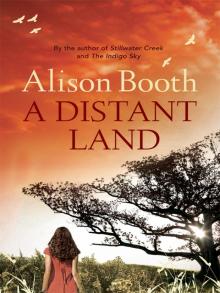 A Distant Land
A Distant Land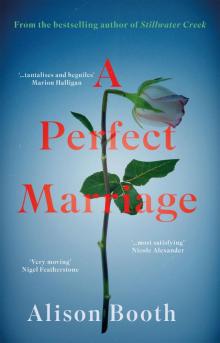 A Perfect Marriage
A Perfect Marriage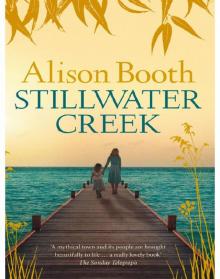 Stillwater Creek
Stillwater Creek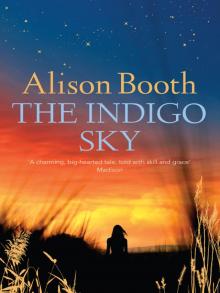 The Indigo Sky
The Indigo Sky